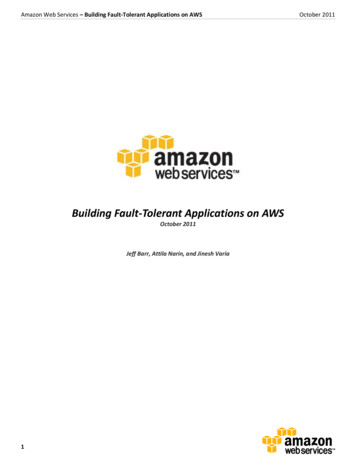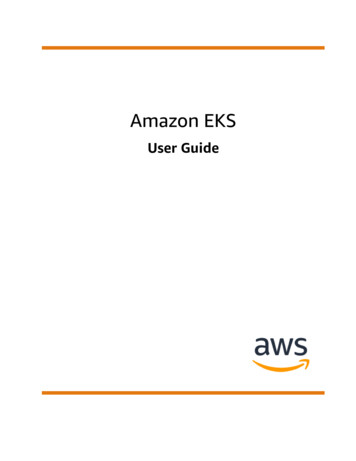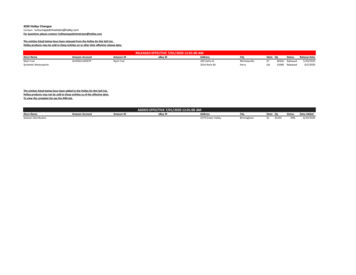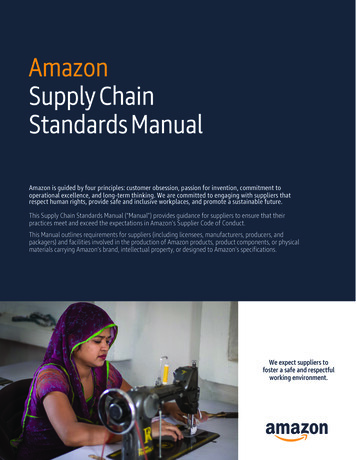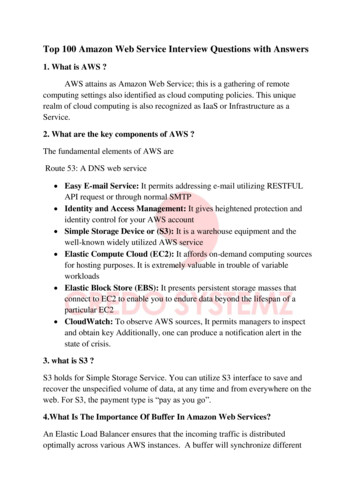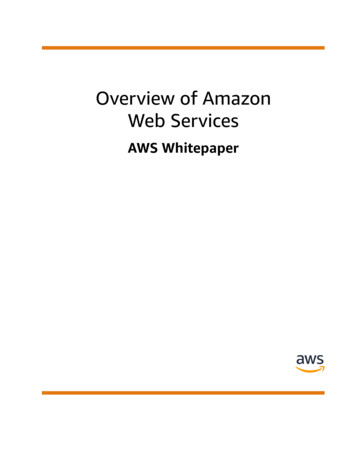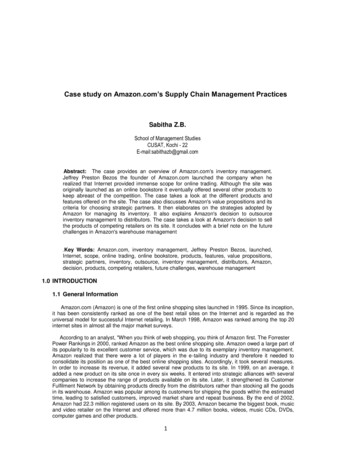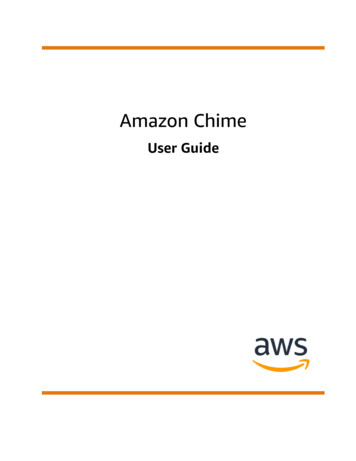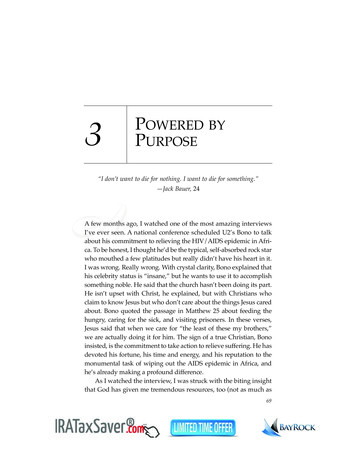
Transcription
3POWERED BYPURPOSE“I don’t want to die for nothing. I want to die for something.”—Jack Bauer, 24AA few months ago, I watched one of the most amazing interviewsI’ve ever seen. A national conference scheduled U2’s Bono to talkabout his commitment to relieving the HIV/AIDS epidemic in Africa. To be honest, I thought he’d be the typical, self-absorbed rock starwho mouthed a few platitudes but really didn’t have his heart in it.I was wrong. Really wrong. With crystal clarity, Bono explained thathis celebrity status is “insane,” but he wants to use it to accomplishsomething noble. He said that the church hasn’t been doing its part.He isn’t upset with Christ, he explained, but with Christians whoclaim to know Jesus but who don’t care about the things Jesus caredabout. Bono quoted the passage in Matthew 25 about feeding thehungry, caring for the sick, and visiting prisoners. In these verses,Jesus said that when we care for “the least of these my brothers,”we are actually doing it for him. The sign of a true Christian, Bonoinsisted, is the commitment to take action to relieve suffering. He hasdevoted his fortune, his time and energy, and his reputation to themonumental task of wiping out the AIDS epidemic in Africa, andhe’s already making a profound difference.As I watched the interview, I was struck with the biting insightthat God has given me tremendous resources, too (not as much asFree Workshops and Webinars! Jim Munchbach69
MAKE YOUR MONEY COUNTBono, but plenty), and I can choose to use everything I am and everything I own to make a difference in other people’s lives. Whenthat interview began, I certainly didn’t expect the words of a rockstar to penetrate my soul and inspire me to action. Bono’s interviewwas the tipping point to encourage me to write this book to helpothers connect their resources to what matters most.We don’t have to have great wealth or a worldwide reputationto make a difference. All we need is heart. My wife Connie has beenan elementary school teacher for 20 years, and her heart is in tunewith Bono’s and Jesus’. Every year, I watch her devote herself tothose young students. She genuinely cares for them as little peoplewith hopes and hurts, dreams and fears. After 20 years, she couldput herself on autopilot, but she doesn’t. She still prepares for eachday like it’s the most important day in those children’s lives. Overand over, I’ve seen her cry because a child is having dif!culties athome, and Connie empathizes with that child’s pain. Parents tellme how much their children love Connie, and they talk about howtheir kids love to go to school and learn because Connie loves themand makes school an adventure for them. Do you remember yourkindergarten teacher? These kids will remember theirs, and manyof them will do a little better in school and in life because an obscure kindergarten teacher cared enough to pour her life and herlove into them.Some people may be reading this book and feel a bit frustratedby now. They’re thinking, We’re in the third chapter, but we haven’tgotten into budgeting and investing yet. When is this guy going to getwhere I want to go? If you’re feeling frustrated that we aren’t movingfaster, I want to assure you that we’ll get to all the details of !nancial management you can handle. But I’ve found that most people’schoices with !nances only makesense when they’re moving in aDefining or clarifying yourclear, purposeful direction. If yousense of purpose is antry to make those decisions withessential element—actually, out a sense of purpose for yourlife, you’ll be easily sidetrackedthe essential element—inand end up confused and empty.financial planning.De!ning or clarifying your sense70 Jim MunchbachFree Workshops and Webinars!
POWERED BY PURPOSEof purpose is an essential element—actually, the essential element—in !nancial planning. The needle on the compass of your life directseverything you are, everything you do, and everything you have.DEADENDSA few years ago, Connie and I took a vacation to Washington,D.C., and northern Virginia. I love history, and we enjoy visitinggrand houses, so two of our stops were to George Washington’sMt. Vernon and Thomas Jefferson’s Monticello. After touring thehomes and listening to the guides talk about these men, I realizedthey were very different personalities.These two men fascinated me, so I studied their lives. I learnedthat Washington accepted the command of the Continental Armywhen that ragtag bunch had almost no hope against the BritishRedcoats, the most powerful army in the world. He risked everything for a cause that seemed doomed to fail, but his courage andresolution carried him and his men through long, dif!cult yearsof battle, death, disease, and bitter cold. As general and as the !rstpresident, Washington’s nobility and integrity guided him and ourcountry. Over and over, people wanted this great man to becomemore of a king than a president, but he always humbly gave poweraway instead of insisting on more. After two terms, he chose to stepaway from power when he could easily have been president forlife. When Emperor Napoleon heard that Washington had voluntarily stepped down, he was amazed. Faced with the thought ofdoing the same thing, he remarked, “I am no Washington!”Jefferson’s crucial role in the founding of the country is undeniable. The beauty and power of his thoughts in the Declaration ofIndependence continue to inspire us today, but in his biographyof John Adams, historian David McCullough describes a dark sidein Jefferson’s life. During Washington and Adams’s administrations, Jefferson repeatedly schemed to tarnish Adams’ reputation,though he denied any involvement in these activities at the time.Instead of nobility and integrity, Jefferson’s political legacy readsmore like Watergate.Free Workshops and Webinars! Jim Munchbach71
MAKE YOUR MONEY COUNTIn their !nancial dealings, Washington and Jefferson were polesapart. Both owned large plantations, and they experienced !nancial hardships in the early years of the country. Washington wasdisciplined and wise in his handling of money, and when he died,he had one of the wealthiest estates in the nation. In contrast, Jefferson spent money on frivolous things his entire life. His journalsrecord lavish expenses for all manner of purchases, from the !nestleather gloves to the best wines. To pay off his loans, Jefferson oftensold slaves and broke up their homes. When he died, his estate wasdeeply in debt, and he left a legacy of sel!shness, foolish spending,and shattered families.William James wrote, “The greatest use of a life is to spend it forsomething that outlasts it.” Sadly, many people follow the example of Jefferson more than Washington. When I meet with clients,I typically ask questions about what matters most to them. Sometimes, I hear descriptions of wonderful, compelling purposes thatinspire me, but sometimes people tell me that all they want in life isto have more money to spend on themselves. These people may berelentlessly driven to achieve success at all costs, or they may haveinherited their wealth and be able to indulge every whim. Either way,their self-absorption causes them to miss out on rich relationships,the joy and peace of real contentment, and the thrill of seeing theirlives touch others. They may have a lot of money and a lot of passionto have even more, but their paths lead eventually to dead ends.In my life (and I suspect I’m not alone in this), one of the biggestengines that propels me down the dead end roads is comparison.For years, I woke up every day consciously or subconsciouslycomparing the possessions and pleasures Connie and I had to whatothers had. My conclusion was that I needed a bigger house, a biggercar, a bigger bank account, and a bigger wife (just kidding, Connie).If others’ successes and possessions are the measuring stick, nothingis ever good enough because we can always !nd people who havemore and bigger stuff. Companies throw gas on this !re of misplaceddesire when they give awards, accolades, and plaques that honorthose who led the company in sales—even if they lost their families and their health in their drive to achieve. Company directors can72 Jim MunchbachFFree Workshops and Webinars!
POWERED BY PURPOSEtell who has “the comparison virus” and will sell their soul to bethe top salesman so at the annual meeting, the boss will call themup on stage and say, “You are the best! Everybody, look at him (orher). This is what you can be if you work as hard.” I know how allthat works because I bought that line. I was consumed with comparison. I was winning awardsand making a lot of money, butafter a while, I felt completely It’s important for all of usemotionally bankrupt. I became to spend our lives forclinically depressed—hopeless, something that outlasts it.helpless, and confused. Comparison rotted my soul.It’s important for all of us to spend our lives for something thatoutlasts it. Whether we’re currently buried in debt, barely abovewater, or bucks in the bank, but still worried, we can take steps todiscover what’s really meaningful to us.LOVEANDLOYALT YPeople and causes; love and loyalty. I believe those are the ingredients of a life of purpose. If we look past our sel!sh desires, we!nd people we love and causes that inspire our loyalty. That’s whatmakes life worth living and keeps us from paths leading to a deadend. When I think of love and loyalty, soldiers come to mind. I’vewatched lots of documentaries of men at war, and whether !ghtingin World War II, Korea, Viet Nam, Iraq, or anywhere else, men inthe trenches often say they joined to !ght for our country and freedom (noble causes), but in the heat of battle, they !ght, bleed, anddie for the guy next to them in the foxholes.The people we live for are usually under our roofs, but we mayexpand the circle of purpose to include individuals and groups thatshare our commitment to a noble cause. We may, like Bono, devoteourselves to relieve suffering or stop the spread of disease, or wemay invest our time, energy, and money in building houses for thepoor, caring for prisoners or the elderly, sharing the Good Newsabout Christ, helping someone who’s hungry or hurting, or any ofhundreds of other noble efforts.Free Workshops and Webinars! Jim Munchbach73
MAKE YOUR MONEY COUNTI’ve heard people say that we should be able to write our life’spurpose on the back of a business card, but I think life’s a bit morecomplicated than that. Most of us have many different responsibilities, so our purpose in life will re"ect those complexities. If we’regoing to live for something or someone beyond ourselves, we canlook at three areas of life:First, we begin with our families.A major part of my purpose is to provide for Connie and ourkids—not just !nancially, but in every way that a good husbandand father provides. Some of us may be tempted to dream bigdreams for our lives—and I’m all for that—but the biggest dreamsshouldn’t bypass our most cherished relationships. At the end ofmy life, my dreams won’t be nearly as important as the qualityof relationships I’ve had with Connie, JR, Brandon, and Carissa. Imay want a new Lexus and other expensive toys, and I can affordthem—but not if I want to provide money for a college educationfor my kids, a nice wedding for Carissa, and some great vacationsthat make memories for a lifetime. Putting my family !rst meanssaying “no” to some things I’d really enjoy for a while, but that’sokay with me because my family is an enduring treasure.I’d like to say that I’ve always had this perspective, but thatwould be a lie. For years, I put my career !rst, spending my resources of time, money, and affections on building the biggestbusiness I could build. I was driven to be a success, but in the backof my mind, I felt guilty and ashamed that I wasn’t the husbandand father I knew I could be. I came to a point that I !nally saw theemptiness of my pursuits and the damage I was in"icting on thoseI loved. During that painful season, I faced reality and made thechoice to value my family more than my own career. My only regretin that decision is that it took a while for me to “get it.”Next, we can examine our own lives and notice the activities thatbring us the most fulfillment.Those things that bring us the most joy and stimulate our passions are almost certainly part of our purpose in life. For example,74 Jim MunchbachFree Workshops and Webinars!
POWERED BY PURPOSEa friend of mine is in a management position in his company, buthe told me, “You know, I can manage schedules and work loadsjust !ne, but what I really enjoy—what really revs my engines—iswhen I can build con!dence and skills into people’s lives. I love tosee other people succeed!” He just described an important elementin his life’s purpose.Some of us dream of making a difference beyond our normalsphere of influence.Many of us are completely satis!ed with providing for ourfamilies and using our abilities in ful!lling ways at work or in ourcommunities, but we are wise to at least consider one more step: Wecan dream about touching countless lives if we step out of the normalway of doing life and go for even more. Certainly, most of us are notentrepreneurs. Many of us are quite content making a difference inour own spheres of life, but someof us long for a bigger impact.Something inside propels usSomething inside propels us todream, like Bono, of gathering to dream, like Bono, of gathpeople and resources and making ering people and resourcesa huge difference in a communi- and making a huge differencety, a nation, or the world. Let me in a community.give you a few examples. William Wilberforce was a homely little man who served inBritain’s House of Parliament. After he became a Christian, he re"ected on God’s intention for his life. Soon, he was convinced ofhis purpose. He wrote perhaps the shortest and most challengingpurpose statement I’ve ever read: “God Almighty has set before metwo great objects, the suppression of the Slave Trade and the Reformation of Manners [turning people from vice to virtue].” Englandwas the world’s greatest sea power, and much of its commerce wasbuilt on the backs of slave labor. For this reason, powerful forcesin government and industry opposed Wilberforce’s efforts to freethe slaves. He was sometimes physically beaten and often verballyridiculed, but he was resolute in his purpose. Just days before heFree Workshops and Webinars! Jim Munchbach75
MAKE YOUR MONEY COUNTdied, news reached him that a bill had passed to outlaw the slavetrade. His purpose was ful!lled. On a more personal level, Phyllis Stanley wrote:“I want to live my life very purposely, regularly reviewing andpraying over my purpose in life, loving God intensely, cherishingand inspiring my husband, praying for and keeping connected spiritually with my children, loving women and seeking to lay spiritualfoundations in their lives.“I want to live faithfully, believing God for what I cannot see. Iwant to believe that God can do in my children’s lives what I cannot do.“I want to live creatively, creating beauty and warmth in myhome, around my table, and in my Bible study. Creativity addssparkle to a focused, purposeful life.“I want to live paradoxically. I want to go against my sel!shnature, against our culture, giving a little bit more than I feel likegiving, going the second mile, being like Jesus.”10 And a friend of mine shared his purpose with me. It reads:“After thinking about how I’ve experienced ful!llment andwhat I want people to say at my funeral, my purpose is:— That my family would be convinced that I genuinely lovethem.— That I provide adequately for them.— That I impart some measure of wisdom to my family, friends,and clients.— That I help people wrestle with the complexity of God andhis will for us.— That I serve to deepen and extend people’s God-givenmessages.”Our purpose statement doesn’t have to follow anyone’s direction or design. Far more importantly, it needs to come from our1076Quoted by Linda Dillow in Calm My Anxious Heart, (Navpress, ColoradoSprings, 1998), p. 105. Jim MunchbachFree Workshops and Webinars!
POWERED BY PURPOSEhearts. The ultimate direction for our lives seldom is clear at the beginning. Most of us need time and experience to re!ne our desiresand discover the things that matter most to us. Stephen Covey, author of the best-seller, Seven Habits of Highly Effective People, wrote,“Whatever is at the center of our life will be the source of our security, guidance, wisdom, and power.”AUTHENTICITYANDACT I ONThings have changed since the 18th century when Wilberforcetrusted God to use him to free the slaves. Today, the obstacles toful!lling our purposes aren’t governments and industries. We facethe soul numbing multiple effects of incredible disposable wealth,the rapid speed of life, a vast array of options for any decision, andrelativism that tells us that all choices are equally valid. The sheerquantity of choices we face each day is mind-boggling. For example, only a few years ago, television offered only three networks,but today, cable or dish TV offers hundreds of options for everyhour of the day. Technology has made even the most obscure information available in a heartbeat, and we can communicate with eachother with startling ease.In addition to the vast amounts of money, technology, and comforts we enjoy, spectacular failures in government, business, andthe church have eroded trust in authority. We may conclude thatwealth, the speed of life, relativism, and being cynical of authorityhave shattered people’s sense of purpose, but they haven’t. They’rejust looking for something they can really believe in. Today, peoplelong for and look for authenticity. They don’t care what anyonepromises (they hear promises all day, every day). They want toknow if people are authentic, with integrity and gut-level honesty,and willing to admit when they don’t have all the answers.People who value authenticity don’t want to just write a purposestatement in a notebook. They want to take action. If they say theirpurpose is to help homeless people, they go downtown to take somefood and clothes to people who live under bridges. If they committhemselves to teach children of immigrants to read, they carve outFree Workshops and Webinars! Jim Munchbach77
MAKE YOUR MONEY COUNTsubstantial time to do the research, !nd the best methods and organizations, and go to these children to teach them new skills.Many young people I meet realize the “opportunity costs” oftheir choice where they invest their lives, so they take a little extratime to consider the implications of their decisions. They understand that when they say “yes” to one mission, they’re saying “no”to countless others. They have a !nite amount of time and money,so they want to be sure that they are investing in the things thatreally matter. Years ago, people trusted authority more than theydo today, and they were willing to be told which direction to go.But no longer. This generation researches the options, weighs thepossible outcomes, and makes decisions based on gut-level instinctand input from peers.Purpose isn’t stagnant. Few of us have a single, compelling purpose throughout our lives like Wilberforce. For most of us, our senseof direction and passion shifts aswe uncover new abilities and disFor most of us, our sense of cover new responsibilities anddirection and passion shifts opportunities. As the years goby, our purpose may seem moreas we uncover new abilities clouded at one time than anothand discover new responsier, but hopefully, it will becomebilities and opportunities.clearer as we actively engage inthings that stimulate our interests and awaken our souls.Older generations sometimes could articulate a clear purpose,but too often, they failed to put their resources into action to make areal difference, or their personal lives failed to match up with theirstated purposes. Today’s generation is looking for something authentic, something rich and real, and something more than piousstatements that they can pour their lives into. They want their livesto count in tangible ways.As we’ve been saying in these !rst three chapters, uncoveringand clarifying what matters most gives direction to every area ofour lives, including !nancial planning. A clear, compelling purposecaptures our hearts. We get up every day (or most days, anyway)78 Jim MunchbachFree Workshops and Webinars!
POWERED BY PURPOSEwith a sense that our lives are going to count for something beyondour own sel!sh demands. That’s fantastic! Our purpose energizesus and makes us want to use every resource we possess to make adifference in the lives of our family, our work, our neighborhood,and in any cause that makes our hearts sing.No matter what our !nancial condition might be, establishinga clear purpose is an important step in providing motivation forchange. Those who are buried in debt will realize that they’ve beenhustling down the wrong path, and now they can change direction. First, they can take steps to get out of debt so they will be freeto pursue their purpose with enthusiasm and passion. Those whoare barely above water will grasp the fact that real life is a lot morethan just getting by. With a strong, new sense of direction, they’ll bemotivated to make better choices to provide for the future and accomplish their life’s mission. Those who have bucks in the bank butare still worried will have their worries melt away in the warmthof con!dence in God and in their future. And those who are full ofpurpose and contentment will continue to help others !nd and follow real meaning in life with even more clarity.TRANSCENDENCEOne of the refreshing elements of the younger generation’sview of life is that they ask tough questions without assuming theanswers. This unnerves some of us, but it encourages us to look atthings from a fresh perspective. They’re willing to ask questionslike, “If God exists, what difference does he make in my life? Doeshe have any claim on me? Does he really have a purpose for me?”Actually, those are questions seekers have asked for millennia.Answers can be elusive, but author Os Guinness has concluded thatif God indeed exists, and if he is involved in our lives, then surelyhis purposes permeate every !ber of our existence. In his insightfuland challenging book, The Call, Guinness de!nes our purpose as“the truth that God calls us to himself so decisively that everythingwe are, everything we do, and everything we have is invested witha special devotion and dynamism lived out as a response to hissummons and service.”1111Os Guinness, The Call, (Word Publishing, Nashville, 1998), p. 4.Free Workshops and Webinars! Jim Munchbach79
MAKE YOUR MONEY COUNTWe live in a tangible world, and to a large degree, our existenceis dominated by what we can see, feel, hear, taste, and smell. ButGod “has put eternity in our hearts,” and we instinctively knowthere’s something beyond the tangible. The unseen world is everybit as real as the seen, and we long for the invisible to make a difference in our lives. The perspectives and convictions we absorb as we“reach for the invisible God” give us direction for our choices in thevisible world of relationships, work, time, and money.Certainly, throughout history, some people have lived meaningful lives apart from God. They have cared for the poor, builtlibraries, provided medical care, educated children, and performeda host of other noble works. But apart from the centerpiece of atranscendent purpose, one that is de!ned and guided by God himself, people often slip back into a self-absorbed existence. Instead ofthe thrill and challenge of changing lives, they experience naggingemptiness punctuated by "eeting moments of elation.But we can’t just add Jesus to our already full lives. Christ didn’tcome to help us be more successful in our sel!sh pursuits. He cameto revolutionize our lives, to giveus love for the unlovely and broken hearts for the hardhearted.If we’re looking for loveIf he is truly who he says heand loyalty to drive us, foris—the Savior who forgives anda person and a cause thatthe Almighty God who spokeinspire us, then we needand created the universe with alook no further than Jesus.word—then he commands ourwonder and devotion. If we’relooking for love and loyalty todrive us, for a person and a cause that inspire us, then we needlook no further than Jesus.Jesus didn’t try to make following him sound easy. His purposebrings far more ful!llment than anything else life can offer, but hispath leads us through valleys as well as to mountaintops, full ofchallenges as well as thrills. He told his followers, “Anyone who intends to come with me has to let me lead. You’re not in the driver’sseat; I am. Don’t run from suffering; embrace it. Follow me and I’ll80 Jim MunchbachFree Workshops and Webinars!
POWERED BY PURPOSEshow you how. Self-help is no help at all. Self-sacri!ce is the way,my way, to !nding yourself, your true self. What kind of deal is itto get everything you want but lose yourself? What could you evertrade your soul for?” (Matthew 16:24-26)Jesus was communicating “the paradox of purpose”: If we pursue self-ful!llment, we’ll end up empty, but if we give our livesaway, we’ll experience love, peace, joy, and tremendous satisfaction. Self-absorption, Jesus assured us, guarantees an empty life.We may get everything we want, but we lose what’s most important and most ful!lling: rich relationships and the thrill of seeingthat our lives really count. But purpose is personal. As we read theScriptures and pursue God’s direction for our lives, he will giveeach of us light and life, but his purpose will be uniquely craftedaccording to our personalities, our abilities and passions, and theopportunities he gives us right where we live.Often people ask, “Just how does it work? How does God showus our purpose?” Those are great questions, and the answers aren’tthat simple. We may want something dramatic, but God usuallyshows us his path for us in more humble ways. For every Moseswho saw a burning bush, there are a million others whose purpose is clari!ed bit by bit and day by day as we read the Scripturesto learn more about God’s character and his plan, as we pray forGod’s leading, as we increasingly tune our hearts to sense the HolySpirit’s prompting and nudging, and as we trust God to open doorsof opportunity. When we take steps of faith, we realize that we’regood at some things, but not so good at others. Our friends andleaders af!rm what they see in us, and we feel encouraged by theirinput. No, this process isn’t nearly as exciting as seeing a burningbush or hearing an audible voice, but that’s the way God leads thevast majority of us as we pursue a purpose that lines up with God’s.As that purpose captures our hearts, we’ll use every resource in ourlives to ful!ll it.One of the biggest bene!ts of clarifying our purpose is that wecan learn to rest. Rich, real wisdom doesn’t come our way whenwe’re "ying through life at 90 miles an hour. For many people Imeet with, life feels like a runaway freight train. When Moses cameFree Workshops and Webinars! Jim Munchbach81
MAKE YOUR MONEY COUNTdown from the mountain with the Ten Commandments, one of themtold us to stop regularly to re"ect, think, and talk about what matters most. That’s a lesson we still need to learn today. No amountof religious activity can replace the bene!ts of rest. One of the mostimportant insights men and women can learn in our culture is theabsolute necessity of changing pace, slowing down, and re"ectingabout the most meaningful things in our lives.For years, I measured the meaning of my life by the number ofthings on my to-do list and the names in my appointment book.The more the better. And in fact, I was only satis!ed if I had torush from place to place with no time in between. In his article,“Diagnosing Hurry Sickness,” in Leadership magazine, popular author John Ortberg identi!ed two signs of stress—speeding up andmulti-tasking: “Speeding up. You are haunted by the fear that you don’t haveenough time to do what needs to be done. You try to read faster,lead board meetings more efficiently, write sermons on the fly,and when counseling, you nod more often to encourage thecounselee to accelerate.” “Multiple-tasking. You find yourself doing or thinking more thanone thing at a time. The car is a favorite place for this. Hurry-sickpastors [and anyone else, for that matter] may drive, eat, drinkcoffee, listen to tapes for sermon ideas, shave or apply make-up,direct church business on the car phone—all at the same time. Orthey may try to watch TV, read Leadership, eat dinner, and carryon a phone conversation simultaneously.”12Hurry sickness is an epidemic in our culture. It promises success, but robs us of meaning. One of the most courageous thingsany of us can do is face our compulsion to hurry and take boldsteps to stop, rest, and re"ect. Try it. It’ll change your life.1282John Ortberg, “Diagnosing Hurry Sickness,” Leadership, Fall, 1998. Jim MunchbachFree Workshops and Webinars!
POWERED BY PURPOSEBIGDREAMS, BIGHEARTSEarly in my career, I was driven to become a success. At thattime, I thought ambition was the highest virtue in anyone’s life. Later, when I began following Jesus, I became much more suspiciousof ambition—especially my own. Ambition, though, is neutral. Thedrive to achieve can be right or wrong, good or bad, depending onthe purpose. If it’s noble, then ambition can be shaped and directedby love and loyalty instead of self-promotion.I’ve learned that it’s wise to be cautious about great goals andbig dreams. After all, Jesus said, “The meek [not power-hungrypeople] shall inherit the earth.” Those who have bigger dreamsmust wrestle with pride and humility, and humility comes frombeing broken, the painful process of realizing that our sel!shambitions are stubborn and in- Humility comes from beingsatiable. When stubbornness broken, t
Free Workshops and Webinars! Jim Munchbach 71 of purpose is an essential element—actually, the essential element— in ! nancial planning. The needle on the compass of your life directs everything you are, everything you do, and everything you have. D EAD ENDS A few years ago, Connie and I took a vacation to Washington,
